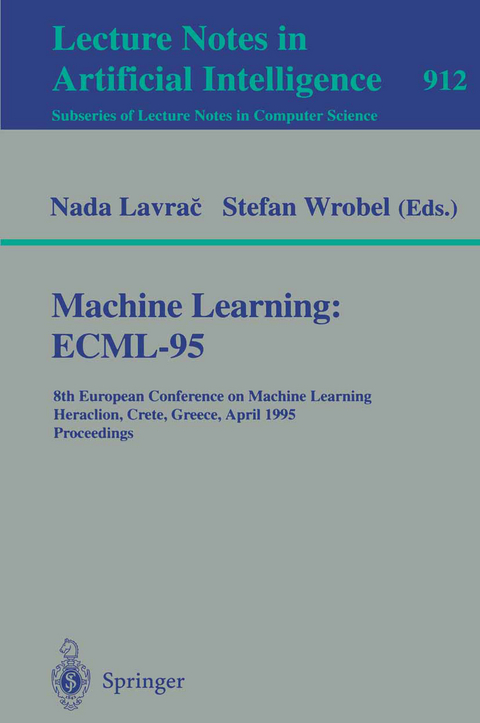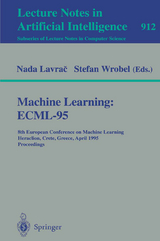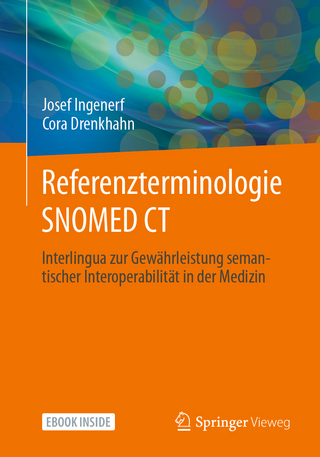Machine Learning: ECML-95
Springer Berlin (Verlag)
978-3-540-59286-0 (ISBN)
Besides four invited papers the volume presents revised versions of 14 long papers and 26 short papers selected from a total of 104 submissions. The papers address all current aspects in the area of machine learning; also logic programming, planning, reasoning, and algorithmic issues are touched upon.
Prof. Dr. Nada Lavrac heads the Department of Knowledge Technologies at the Jo ef Stefan Institute in Ljubljana. She is the author and editor of several books and proceedings in the field of data mining and machine learning, and she has chaired or served on the boards of the main related journals and conferences. Her research interests include machine learning, data mining, and inductive logic programming, and related applications in medicine, public health, bioinformatics, and the management of virtual enterprises. In 1997 she was awarded the Ambassador of Science of Slovenia prize, and in 2007 she was elected as an ECCAI Fellow.
Reasoning and learning in probabilistic and possibilistic networks: An overview.- Problem decomposition and the learning of skills.- Machine learning in the world wide web.- Abstract computer models: Towards a new method for theorizing about adaptive agents.- Learning abstract planning cases.- The role of prototypicality in exemplar-based learning.- Specialization of recursive predicates.- A distributed genetic algorithm improving the generalization behavior of neural networks.- Learning non-monotonic logic programs: Learning exceptions.- A comparative utility analysis of case-based reasoning and control-rule learning systems.- A minimization approach to propositional inductive learning.- On concept space and hypothesis space in case-based learning algorithms.- The power of decision tables.- Pruning multivariate decision trees by hyperplane merging.- Multiple-Knowledge Representations in concept learning.- The effect of numeric features on the scalability of inductive learning programs.- Analogical logic program synthesis from examples.- A guided tour through hypothesis spaces in ILP.- JIGSAW: Puzzling together RUTH and SPECTRE (Extended abstract).- Discovery of constraints and data dependencies in relational databases (Extended abstract).- Learning disjunctive normal forms in a dual classifier system (Extended abstract).- The effects of noise on efficient incremental induction (Extended abstract).- Analysis of Rachmaninoff's piano performances using inductive logic programming (Extended abstract).- Handling real numbers in ILP: A step towards better behavioural clones (Extended abstract).- Simplifying decision trees by pruning and grafting: New results (Extended abstract).- A tight integration of pruning and learning (Extended abstract).- Decision-tree based neural network (Extended abstract).- Learning recursion with iterative bootstrap induction (Extended abstract).- Patching proofs for reuse (Extended abstract).- Adapting to drift in continuous domains (Extendedabstract).- Parallel recombinative reinforcement learning (Extended abstract).- Learning to solve complex tasks for reactive systems (Extended abstract).- Co-operative Reinforcement Learning by payoff filters (Extended abstract).- Automatic synthesis of control programs by combination of learning and problem solving methods (Extended abstract).- Analytical learning guided by empirical technology: An approach to integration (Extended abstract).- A new MDL measure for robust rule induction (Extended abstract).- Class-driven statistical discretization of continuous attributes (Extended abstract).- Generating neural networks through the induction of threshold logic unit trees (Extended abstract).- Learning classification rules using lattices (Extended abstract).- Hybrid classification: Using axis-parallel and oblique subdivisions of the attribute space (Extended abstract).- An induction-based control for genetic algorithms (Extended abstract).- Fender: An approach to theory restructuring(extended abstract).- Language series revisited: The complexity of hypothesis spaces in ILP (Extended abstract).- Prototype, nearest neighbor and hybrid algorithms for time series classification (Extended abstract).
| Erscheint lt. Verlag | 5.4.1995 |
|---|---|
| Reihe/Serie | Lecture Notes in Artificial Intelligence | Lecture Notes in Computer Science |
| Zusatzinfo | XII, 376 p. |
| Verlagsort | Berlin |
| Sprache | englisch |
| Maße | 155 x 235 mm |
| Gewicht | 510 g |
| Themenwelt | Informatik ► Theorie / Studium ► Algorithmen |
| Informatik ► Theorie / Studium ► Künstliche Intelligenz / Robotik | |
| Schlagworte | algorithm • Algorithm analysis and problem complexity • algorithms • Case-Based Learning • Complexity • Concept-Learning • Fallbasiertes Lernen • Genetic algorithms • Genetische Algorithmen • Knowledge Representation • Konzeptuelles Lernen • learning • Lern-Algorithmen • Logic • machine learning • Maschinelles Lernen • programming |
| ISBN-10 | 3-540-59286-5 / 3540592865 |
| ISBN-13 | 978-3-540-59286-0 / 9783540592860 |
| Zustand | Neuware |
| Haben Sie eine Frage zum Produkt? |
aus dem Bereich




